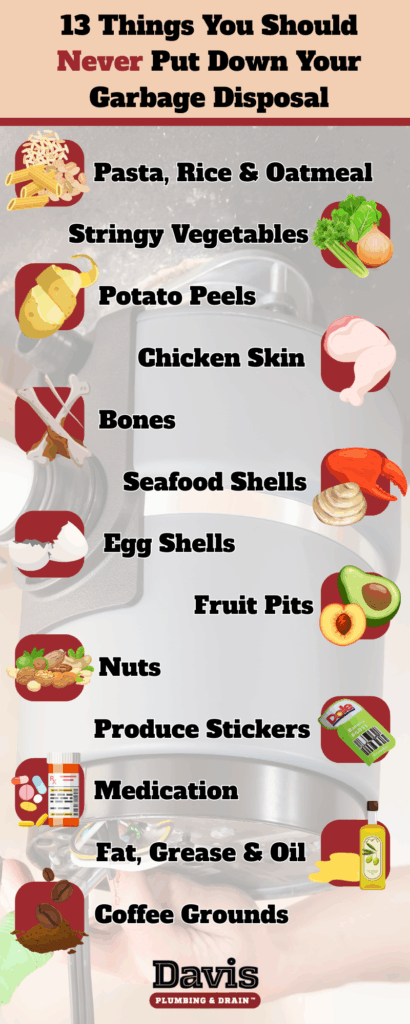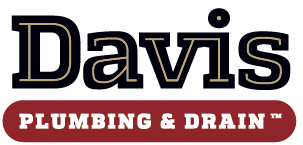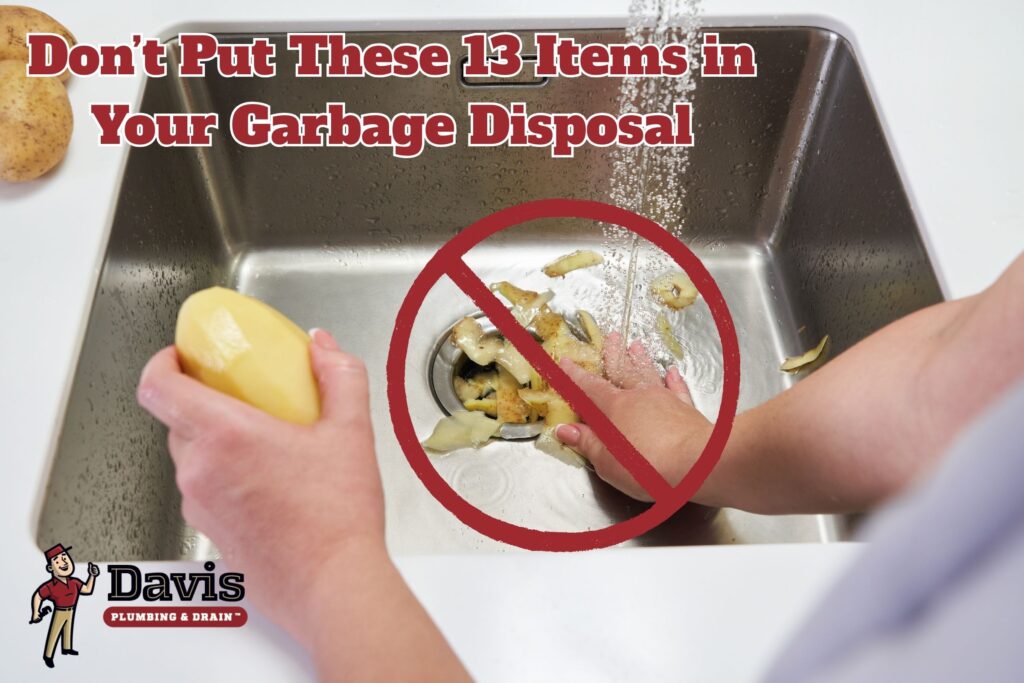Just because it’s called a garbage disposal (or garburator) does not mean you can put all types of “garbage” down it. Feeding it the wrong things will cause bad smells, create clogs, or even damage it.
The pros at Davis Plumbing are here to help you with tips about what not to put down your garbage disposal—and what to do if you already have a clog.

Foods To Never Put Down Your Garbage Disposal
Soft leftovers on your plates, chopped vegetable scraps, and fruit peels will go down the garbage disposal just fine, but here are 13 things that would be better off in your green bin, compost pile, or garbage container.
Sewage backing up through your bathtub isn’t just unpleasant—it’s a serious health hazard. If you’re facing this issue in your New Jersey or Philadelphia home, it’s important to take immediate action. Here, we’ll explain why this happens, common causes, and the steps you should take to address the problem as quickly and effectively as possible.
Pasta, Rice, and Oatmeal
Do you know how macaroni gets bigger as you boil it? Pasta, rice, and oatmeal will all continue to swell with water, even after going through the garbage disposal.
Stringy Vegetables
Most vegetables can be put down the garbage disposal, but fibrous or “stringy” vegetables can tangle around the disposal’s blades. Avoid celery, lettuce, kale, asparagus, and onion skins.
Chicken Skin
There are healthy reasons to remove chicken skin before cooking, but don’t put it down the garbage disposal.
Potato Peels
People like to peel potatoes over the kitchen sink, but if you put those peels down the garburator, they can turn into a gluey mess.
Bones
Technically grinding up smaller bones can be good for the garbage disposal and drain, but larger bones can jam it up or clog your drain. So it’s best to avoid all bones.
Seafood Shells
Lobster, clam, oyster, or mussel shells can damage the disposal unit’s blade or cause a clog.
Eggshells
The thin membrane on the inside of eggshells can wrap around the blades. The eggshells grind down into a sand that can clog pipes.
Fruit Pits
Fruits can be put down the disposal, but remember that cherry, peach, plum, and other fruit pits can cause damage.
Nuts
Do you want to know how to make (sticky) peanut butter or almond butter? It’s actually a very similar process to what your garbage disposal does.
Produce Stickers
While putting banana peels down the garbage disposal is debated, everyone agrees that those little stickers on bananas (apples and some other fruits) must be removed before disposing of the peels.
Medication
Please don’t put drugs down the drain, as it affects our water supply. Return unused medications to the pharmacy.
Fat, Grease, and Oil
Everyone knows not to put grease down the drain, but sometimes people mistakenly think it’s okay to put it down the garbage disposal. Nope. Grease will pass through the garbage disposal and then clog your drain.
Coffee Grounds
People often recommend putting coffee grounds down the garbage disposal to mask the food odor or “clean the pipes,” but, no, coffee grounds form a sludge that can clog your pipes.
What To Do If Your Garbage Disposal Is Clogged
A garbage disposal clogged with food scraps or debris can bring your entire kitchen to a halt. If your unit is humming but not grinding—or worse, not responding at all—it’s likely jammed or blocked.
Common Signs of a Clogged Garbage Disposal
If your garbage disposal is clogged, you might notice the following signs:
- Humming noise without blade movement
- Standing water in the sink
- Slow draining or foul odors
How To Unclog a Garbage Disposal at Home
If you already have a clog, follow this step-by-step guide to clear it:
- Turn off the power at the wall switch and unplug the unit to stay safe.
- Look for visible obstructions using a flashlight. Never stick your hand inside.
- Use tongs or pliers to gently remove food debris caught in the chamber.
- Try resetting the disposal using the red reset button underneath the unit.
- Use an Allen wrench in the bottom slot to manually rotate the blades and dislodge blockages.
Avoid using harsh chemicals. These can damage your disposal’s internal parts and corrode your pipes.
If you’ve tried all of these steps and the unit still won’t drain or turn on, the issue may be deeper in the line. That’s when it’s time to call for professional drain cleaning to clear your garbage disposal and surrounding pipework.
How To Fix a Clogged Kitchen Drain
Sometimes, the problem goes beyond the disposal. If your kitchen sink is still slow or backing up, it might be a sign of a larger drain issue.
Try These Methods First:
- Plunge the sink (with the disposal turned off) using a kitchen plunger to dislodge any blockage.
- Flush with boiling water to melt grease or soap scum buildup.
- Use baking soda and vinegar, followed by hot water, for a non-toxic cleaning method.
If these DIY solutions only work temporarily, you might be dealing with hidden buildup in your drainpipes. Common culprits include:
- Grease and fats
- Starchy foods like rice or potatoes
- Fibrous peels or stringy vegetable scraps
In these cases, it’s best to avoid further damage and schedule a professional drain cleaning service.
When To Call for Professional Drain Cleaning
Some drain and disposal issues require more than a quick fix. You should contact a licensed plumber if:
- Water backs up into both sides of the sink
- Your disposal runs, but the water drains slowly
- You’ve tried plunging and resetting with no success
- There’s a recurring smell or frequent clogs
Davis Plumbing offers trusted, affordable solutions for garbage disposal, drain cleaning, and clogged kitchen drains throughout Cherry Hill, Camden, Burlington, and Philadelphia. We use advanced tools to eliminate years of hidden buildup, restore proper flow, and protect your plumbing.
For stubborn or recurring clogs, we may also recommend sewer line cleaning or plumbing repair services if the problem is more widespread. Contact us today for any issues with your garbage disposal.
FAQ About Garbage Disposals and Clogs
What causes garbage disposal clogs?
Most clogs are caused by improper food waste like grease, bones, coffee grounds, or fibrous vegetable scraps. Overloading the disposal or failing to run cold water while using it can also cause blockages.
Can a garbage disposal clog the sink?
Yes, a garbage disposal can clog the sink. If the disposal or drainpipe is blocked, water won’t drain properly, even if the blades are still spinning. This often causes standing water or backups in both sink basins.
What’s the best way to unclog a garbage disposal?
Start by cutting the power and removing visible debris with tongs. Reset the unit and try manually turning the blades using the hex key underneath. If these don’t work, it’s time to call a plumber.
Do chemical drain cleaners work on garbage disposal clogs?
No, chemical drain cleaners don’t work well on garbage disposals. Chemical cleaners can corrode your pipes and damage the disposal’s internal components. Mechanical clearing or professional drain cleaning is a safer, more effective solution.
Who should I call for a clogged garbage disposal or drain?
Call Davis Plumbing & Drain. We provide expert service for clogged disposals and offer fast, professional drain cleaning in Camden, Cherry Hill, Burlington, Philadelphia, and nearby areas.

